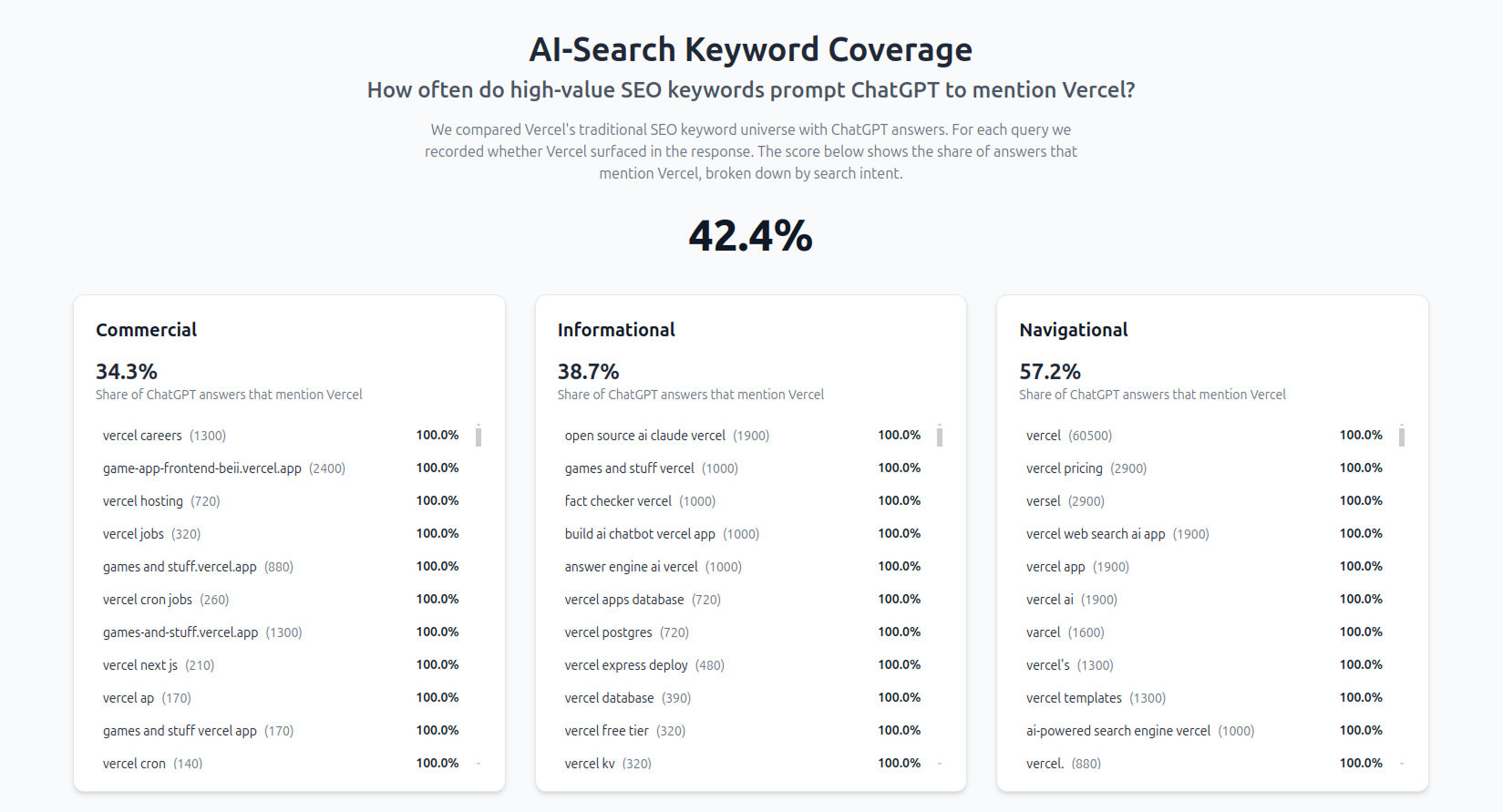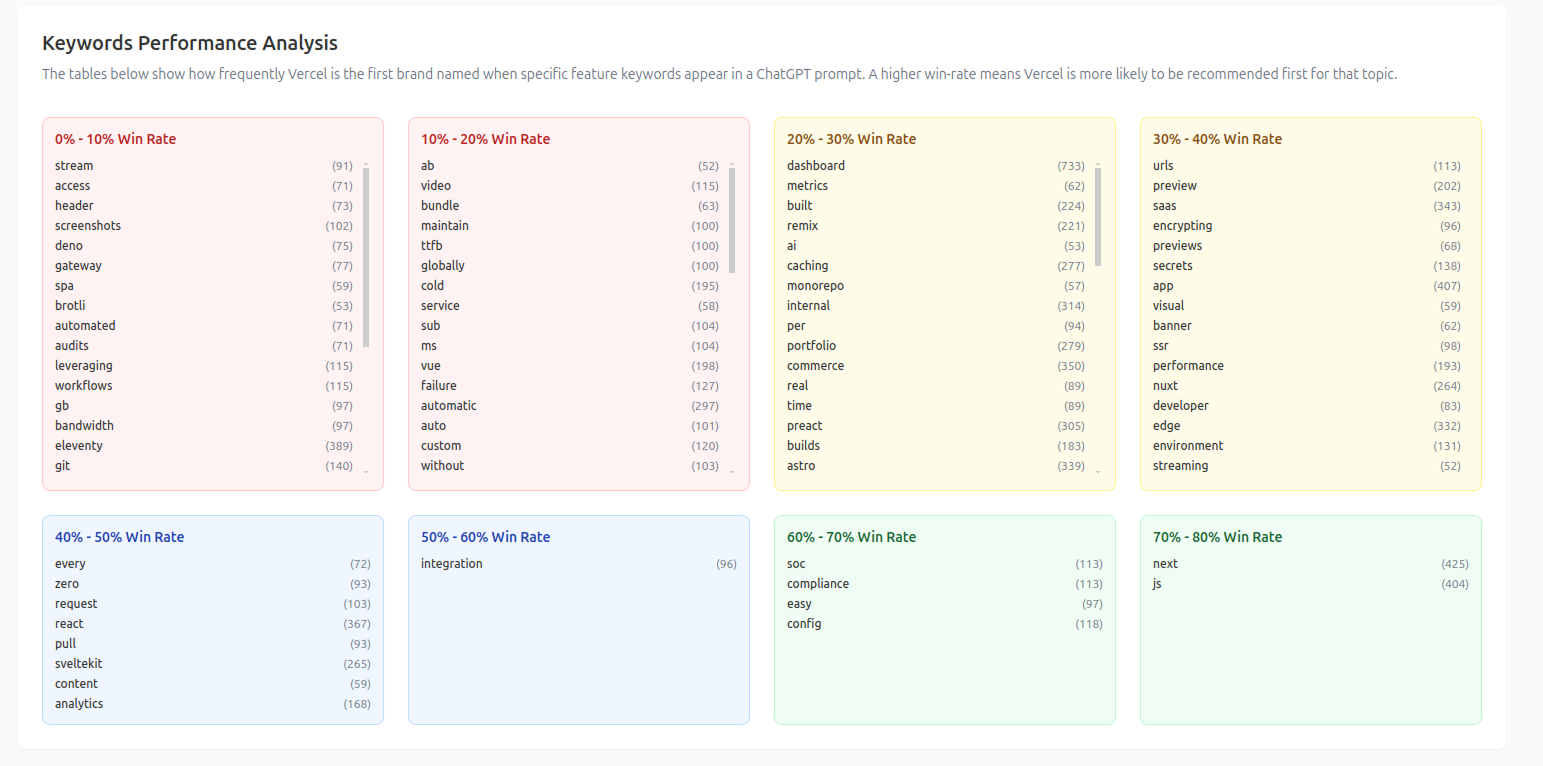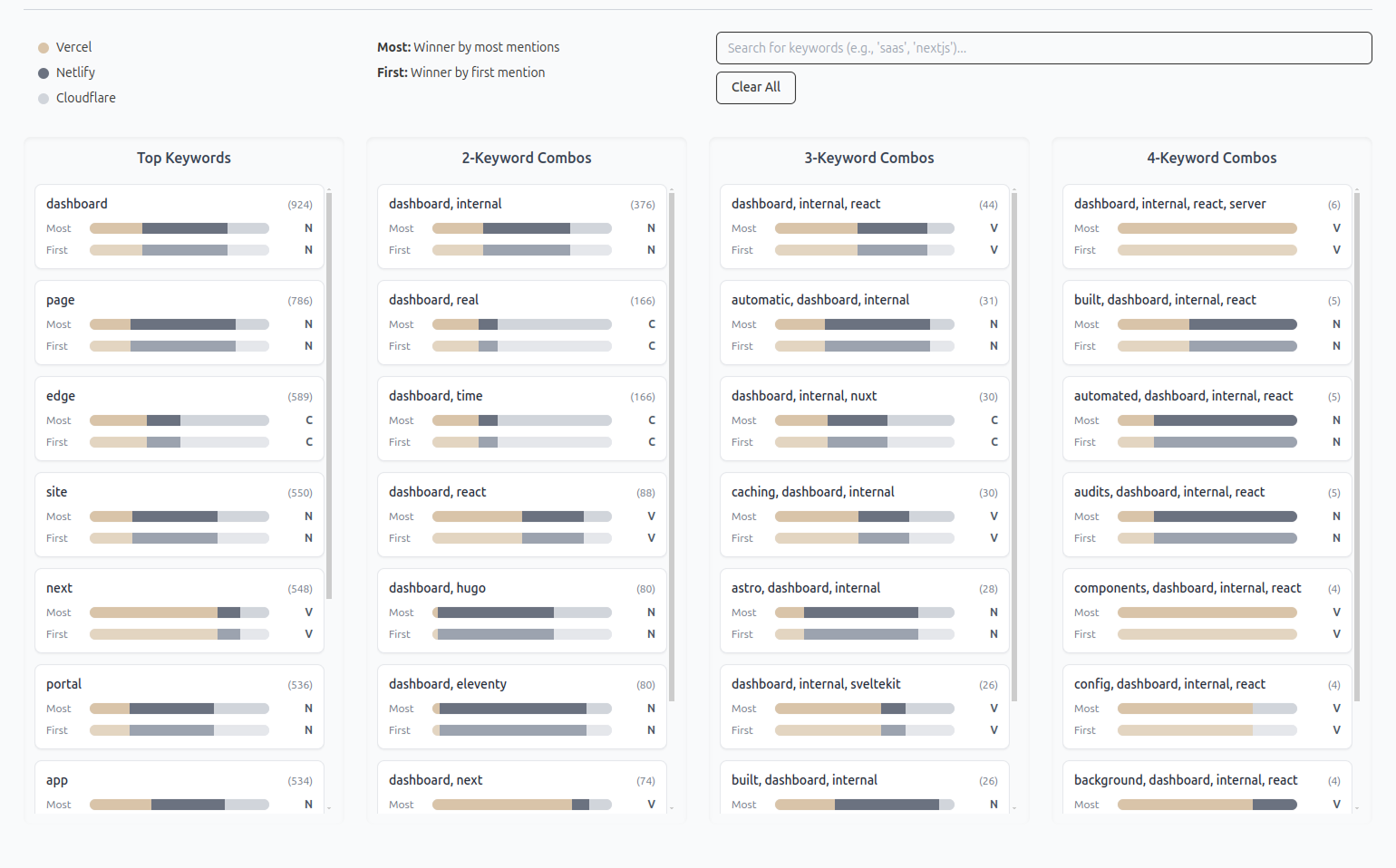AI Search Insight: How 10% of Vercel's Traffic Now Comes from ChatGPT Responses
Approximately 10% of Vercel's entire site traffic is now triggered by responses inside ChatGPT and other large language models. That represents millions of developer eyeballs finding-or missing-the brand before they ever hit Google.
Today we're reverse-engineering the data to see where Vercel shines and where content gaps cost real revenue. This analysis reveals how developer-focused brands can optimize for AI search to capture mindshare at the moment of discovery.
What We Built: AI-Search Insight
Our AI-Search Insight tool asks one simple question: "When developers talk to ChatGPT, how often does it recommend Vercel?"

We slice the answer in two different ways to get a complete picture:
High-Traffic Keywords Analysis
Classic SEO terms that already bring clicks from Google. We check how many ChatGPT answers also mention Vercel.
Why this matters: Shows whether AI-search cannibalizes-or amplifies-existing search wins. If you're already ranking well for "deploy React app" in Google, but ChatGPT never mentions your platform, you're missing a critical touchpoint in the developer journey.
Core-Feature Prompts Analysis
Questions about CDN, edge functions, cron jobs, templates, etc. We measure which brand ChatGPT names first and most often-pure product mind-share.

Why this matters: Exposes pure product mind-share, independent of brand searches or SEO manipulation. When developers ask "What's the best platform for edge functions?" which name comes up first shapes their entire evaluation process.
Methodology in 60 Seconds
Step A - Keyword Lens
- Grab Vercel's top Google keywords from their organic search performance
- Paste each phrase verbatim into ChatGPT-4o
- Log whether Vercel appears in the response, then group by search intent: Commercial / Informational / Navigational
Step B - Feature Lens
- Let GPT itself extract feature nouns from developer-focused answers (edge functions, storage, cron jobs, etc.)
- Query again with "Which platform is best for [feature]?"
- Count which brand wins first mention and total mentions, bucketed into win-rate bands (0-10%, 20-30%, 50-60%, 70-80%)
Keyword Deep-Dive Results
The results reveal a nuanced picture of AI search visibility:
Overall Performance
Vercel is mentioned in 42.4% of the high-traffic queries we tested. Breaking this down by search intent:
- Navigational (brand-seeking) → 57.2%
- Informational (how-to) → 38.7%
- Commercial (buy/pricing) → 34.3%
The All-Good Zone
Any query that literally includes "vercel" or "vercel vs netlify" gives a 100% hit rate. This is expected-branded searches naturally surface the brand. The real insights come from the next category.
The Ghost Zone
Generic intent phrases-"deploy site", "dashboard template", "SvelteKit hosting"-drop below 25% mention rate. This is where developers pick a stack they'll use for months, so every lost mention directly impacts customer lifetime value.
Key insight: Generic, high-intent searches represent the biggest opportunity for market share growth in AI search.
Feature-Based Brand Leaderboard
When we switch to feature-based analysis, ChatGPT's brand preferences become clear:
| Platform | Most Mentioned | First Mentioned |
|---|---|---|
| Netlify | 46.5% | 38.8% |
| Vercel | 24.2% | 34.2% |
| Cloudflare | 29.3% | 26.9% |
The data reveals an interesting dynamic: Netlify owns raw mention volume, but Vercel opens answers surprisingly often before getting crowded out as responses grow longer. Cloudflare lurks whenever infrastructure buzzwords appear.
Feature Bucket Analysis
Breaking down performance by feature category reveals Vercel's strengths and blind spots:

70–80% Win Rate: Vercel's Fortress
- Keywords: "next", "js", "soc", "compliance"
- Analysis: Vercel dominates in its core competency areas, particularly Next.js deployment and JavaScript hosting
50–60% Win Rate: Competitive Battlegrounds
- Keywords: "react", "sveltekit", "analytics", "dashboard"
- Analysis: Toss-ups where a single well-written tutorial can swing market share
20–30% Win Rate: Infrastructure Gaps
- Keywords: "cron", "storage", "cdn"
- Analysis: Cloudflare crushes here despite Vercel shipping Cron & KV storage
0–10% Win Rate: Legacy Platform Moats
- Keywords: "jekyll", "hugo", "bandwidth"
- Analysis: Netlify's nostalgia moat-GPT is still reading 2017 blog posts about static site generators
Strategic insight: Even when you ship a feature, AI models may not associate your brand with it for months. Proactive content strategy is essential for feature mindshare.
AI Search vs Classic SEO: Same Keywords, Different Battleground
In traditional SEO, ranking below the fold on page 1 can still drive significant traffic-developers scroll, compare, and click multiple links. In AI-driven search, that safety net is gone. ChatGPT usually mentions fewer than eight brands per answer, and anything below that short list is effectively invisible.
Our data shows that for keywords where Vercel ranks #4-#6 on Google-"host Node.js app", "React deployment free tier", "serverless cron"-the brand is never cited by ChatGPT. Search cannibalisation isn't the real risk here; it's search obliteration.
If you're not in the answer set, you're not in the conversation.
Inside ChatGPT's Recommendation Engine
Why does the bot pick Netlify twice as often as Vercel when the question is generic? The short answer: retrieval bias and training-data inertia.
- Retrieval Layer: For GPT-4o with web browsing enabled, the model fetches fresh documents at query time. That means recency and schema clarity (structured docs, obvious headings) win.
- Static Memory: The frozen model weights legacy content. Blog posts from 2018 still shape Netlify's strength around static-site generators.
Understanding which layer dominates a given keyword dictates your content playbook-ship timely docs for retrieval wins, or publish canonical deep-dive guides to overwrite static memory.
Intent Deep-Dive: Commercial vs Informational vs Navigational
Earlier we teased the high-level percentages. Let's zoom in on what they really mean:
Commercial Intent (34.3 % coverage)
Queries like "Vercel pricing", "best CDN for startups", or "serverless hosting cost" appear late in the decision funnel. Missing here translates directly into lost ARR. Vercel's sub-35 % share suggests a pricing-page revamp and comparison calculators could pay quick dividends.
Informational Intent (38.7 % coverage)
Tutorial-style questions-"how to deploy SvelteKit", "set up cron on serverless"-sit earlier in the journey yet steer framework choice. Pushing snackable, code-heavy examples into docs and StackBlitz templates can nudge this metric above 50 %.
Navigational Intent (57.2 % coverage)
Great news: When devs already think of Vercel, ChatGPT reinforces that brand. The challenge is expanding the intent universe so that more queries begin as navigational.
Learning 1: Boosting informational coverage delivers outsized gains-today's how-to reader is tomorrow's commercial converter.
Developer Decision Points: Where Vercel Wins and Loses
Mapping the feature buckets onto common developer workflows reveals clear hot-spots:
- Deploy & Iterate: "next", "js", "react" → Vercel dominates. Double-down with repo templates.
- Operate: "cron", "storage", "cdn" → Cloudflare leads. Counter with benchmarks and migration guides.
- Measure: "analytics", "dashboard" → Toss-up territory. A dedicated
analyticsSDK tutorial could tip the scale.
Action Plan: Closing the Ghost Zones
- Publish Comparison Playbooks: Side-by-side tutorials ("Vercel Cron vs Cloudflare Workers Cron") that answer the exact phrasing ChatGPT sees.
- Refresh Legacy Topics: Update 2018 blog posts or create redirects so retrieval points at fresh, schema-rich pages.
- Seed Community Content: Encourage OSS contributors to write guides; user-generated repos increase citation variety.
Learning 2: The fastest path to AI mindshare is owning the exact wording developers copy-paste into ChatGPT.
Multi-Keyword Analysis
Our dashboard lets you string multiple words together-e.g. "edge functions latency"-and see how each brand's share shifts with context.
Example questions the tool exposes content opportunities for:
- "What's the fastest CDN for edge functions?"
- "How do I schedule cron jobs on a serverless platform?"
- "Best template to deploy a React dashboard?"
These represent perfect fodder for documentation, blog posts, or template repositories that can capture AI search mindshare.

Why AI Search Insight Matters for Revenue
Developers rarely switch platforms mid-tutorial. If ChatGPT's first answer points to a rival, you've likely lost that build-and that customer-before they even google pricing.
The Customer Journey Shift
Traditional developer acquisition looked like:
- Google search → Documentation → Trial → Conversion
The new AI-influenced journey is:
- ChatGPT question → Platform recommendation → Direct signup
This compression means owning a bigger slice of AI-Search translates directly to ARR growth.
The Network Effect
When ChatGPT recommends a platform, it often includes:
- Code examples using that platform's APIs
- Configuration snippets
- Best practices aligned with that platform's conventions
This creates a self-reinforcing cycle where AI recommendations drive adoption, which generates more training data for future AI models.
Content Strategy Implications
Our analysis reveals several actionable content strategy insights:
Focus on Feature Education
Don't just announce features-teach developers how to use them in context. A single comprehensive tutorial about "cron jobs on Vercel" could shift that 20-30% win rate significantly.
Target Generic Intent
While branded searches perform well, the highest-value content opportunities lie in generic developer questions like "how to deploy a React app" or "best practices for edge functions."
Multi-Platform Comparisons
Create honest comparison content that positions your platform favorably. AI models often reference comparison posts when developers ask "which platform should I use for X?"
The Future of Developer Marketing
As AI search continues to grow, we expect several trends:
Faster Decision Cycles
Developers will make platform decisions faster, with less research and comparison shopping. First impressions in AI responses become critical.
Content Quality Over Quantity
AI models prefer comprehensive, authoritative content over numerous thin pages. Deep tutorials and guides will outperform keyword-stuffed documentation.
Real-Time Competitive Intelligence
Brands will need tools to monitor their AI search presence in real-time, just as they monitor traditional search rankings today.
Getting Started with AI Search Optimization
Ready to audit your own brand's AI search presence? Here's how to begin:
- Audit your current state: Use our AI Search Insight tool to baseline your brand's mention rate across relevant queries
- Identify content gaps: Look for high-value features where competitors dominate AI responses
- Create authoritative content: Build comprehensive guides, tutorials, and comparisons that position your platform favorably
- Monitor and iterate: Track changes in AI mention rates as you publish new content
The next time ChatGPT talks about deployment, make sure it leads with your platform.
Conclusion
AI search represents a fundamental shift in how developers discover and evaluate tools. The platforms that adapt their content strategy now will build lasting advantages as AI adoption accelerates.
Vercel's case study shows both the opportunities and challenges: strong performance in core competencies, but significant gaps in newer feature areas where competitors have established AI mindshare first.
The key lesson? In AI search, being first to market with a feature isn't enough-you need to be first to market with authoritative content about that feature. Every gap in AI visibility represents lost revenue that's increasingly difficult to recapture.